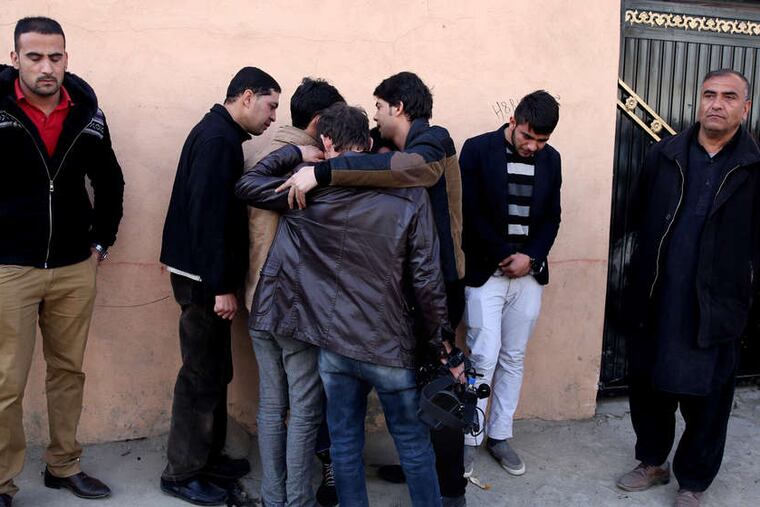New Jersey guy found fighting for ISIS
BAGHDAD - A German journalist who recently spent 10 days with Islamic State extremists in Iraq and Syria said he was surprised to find many were foreign fighters - including some Americans.

BAGHDAD - A German journalist who recently spent 10 days with Islamic State extremists in Iraq and Syria said he was surprised to find many were foreign fighters - including some Americans.
"The guy from New Jersey. This surprised me," Jurgen Todenhofer told ABC News after returning from the region. "You don't expect someone from New Jersey going to join the Islamic State."
Todenhofer, 74, who is working on a book about the group, wrote to 80 militants last year and developed a relationship with two that gained him and his son entry into their self-proclaimed caliphate.
There the German writer met more than a dozen American fighters, including whites and Arab-Americans, some of them born in the U.S. He told ABC that foreign fighters comprised 70 percent of the militants in Syria, 30 percent of the militants in Iraq.
"They were very tough, well-informed. Some of them very successful in their own countries," he told ABC, adding: "They feel discriminated in their countries. They want to live in an Islamic state where no one can bother them, and no one can discriminate against them. They are completely sure they will win this fight."
Ukraine votes to end nonaligned stance
MOSCOW - In a sign of Ukraine's hardening attitude toward Russia, Ukrainian lawmakers yesterday voted to remove a legal barrier to joining the NATO defense alliance.
The vote in Ukraine's parliament had no immediate practical effect on the country's relationship with NATO. But it ended Ukraine's nonaligned status, which was adopted as a way of reassuring Russia that its neighbor would not join NATO. Russian President Vladimir Putin cited his fear of Ukraine's joining NATO as a reason Russia annexed Crimea in March.
The proposal to eliminate nonaligned status passed easily, with 303 of the Ukrainian parliament's 450 lawmakers in support. After the vote, legislators stood up and applauded.
Russian leaders reacted immediately with harsh denunciations, warning Ukraine and NATO that no good could come of the decision.
Is end to ban on gay blood donations near?
WASHINGTON - Federal health officials are recommending an end to the nation's lifetime ban on blood donations from gay and bisexual men, a 31-year-old policy that many medical groups and gay activists say is no longer justified.
The Food and Drug Administration said yesterday that it favors replacing the blanket ban with a new policy barring donations from men who have had man-on-man sex in the previous 12 months. The new policy would put the U.S. in line with other countries including Australia, Japan and the U.K.
Activists, however, questioned whether requiring a year of celibacy from gay men in order to donate blood amounted to a significant policy shift.
The lifetime ban dates from the early years of the AIDS crisis and was intended to protect the blood supply from what was then a little-understood disease. But many medical groups, including the American Medical Association, say the policy is no longer supported by science, given advances in HIV testing. Gay activists say the ban is discriminatory and perpetuates negative stereotypes.
2014 a deadly year for journalists
At least 60 journalists around the world were killed on the job in 2014, including an unusually high proportion of international correspondents, the Committee to Protect Journalists said in its annual report yesterday.
The past three years have been the deadliest for journalists since the New York-based watchdog group started compiling records in 1992.
This year's toll marked a drop from 2013, when at least 70 journalists were killed. CPJ is investigating 18 more 2014 deaths to determine if they were work-related.
Almost half of those killed this year died in the Middle East, and nearly 40 percent were deliberately targeted, the group reported.
Once again, local journalists made up the majority of those killed.
- Daily News wire reports